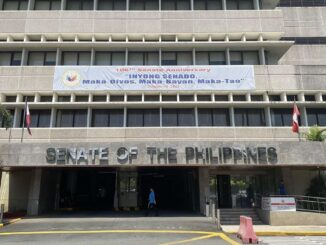
The Anti-Money Laundering Council (AMLC) is seeking funds for 2025 to procure an artificial intelligence (AI) system that could assist it in detecting suspicious transactions following the case of dismissed Bamban, Tarlac Mayor Alice Guo.
Senator Grace Poe, who was speaking on behalf of the AMLC, disclosed this as Senate Deputy Minority Leader Risa Hontiveros asked what additional support the council needs to be “proactive” in flagging laundered money during the continuation of the Senate’s plenary deliberations on the bill containing the proposed 2025 national budget.
“AMLC needs support to procure and sustain the artificial intelligence project and other significant programs of AMLC like subscription of security IT software,” Poe, who defends AMLC’s 2025 budget as chairperson of the Senate finance committee, said.
“This is why we added additional funding under the Senate committee report for the artificial intelligence project of AMLC to help them evaluate the great number of suspicious transaction reports that they receive. Kasi syempre kung mano-mano ‘yan, manual, ‘di ba napakahirap? Daily, how many transactions are there in the bank? So even if you have a threshold there’s still thousands of them,” she explained.
It was Hontiveros who raised Guo’s case during the plenary deliberations and noted that the banks where the money was allegedly used for the POGO operations did not help the AMLC in flagging these transactions.
According to Poe, AMLC has already “opened the enforcement action proceedings” against the banks involved in Guo’s case “to determine if they have violated the requirement” under the Anti-Money Laundering Act (AMLA) to file suspicious transactions reports (SRTs) to the council.
“These proceedings are ongoing and should the AMLC find that they indeed violated the said requirement, the AMLC will file formal charges against said banks or they may be liable for fines ranging from P250,000 to P500,000 per transaction but not exceeding P10 to P20 million depending on the attendant circumstances,” she said.
This is without prejudice to their criminality liability if their officers are found to have knowingly facilitated the crime of money laundering, she added.
Although AMLC is planning to tap technology in flagging suspicious transactions, Hontiveros pointed out that nothing can replace human intelligence and instincts.
These, she said, cannot be simulated by technology.
In supporting the need for technology to assist AMLC’s function, Poe stressed the need to prevent these transactions from proceeding.
“Of course, there’s nothing better than preventing it and prevention actually can be done if there’s strict enforcement of the law,” she said.
“In fact, if the AMLC is actually strengthened, a lot of the issues that were tackled here in the Senate with regards to the POGO could have been prevented early on because of all of those suspicious transactions and the billions of pesos kung na-flag ‘yun early on, baka hindi din lumaganap nang ganyan kalaki,” she added.
Senate Minority Leader Aquilino “Koko” Pimentel III also grilled AMLC for failing to detect the transactions supposedly involved in the POGO operations in Bamban, Tarlac.
Poe said that AI’s help became a necessity because of the failure of banks to report STRs.
“Because of the failure of some covered persons to report through STRs and this is also where it will come into play where the bank representative might have to be investigated as well,” Poe said.
“But, of course, we can’t rely solely on what’s being reported. That’s why I think if we have an objective system such as the computerization of the categories then it will also prompt members of the AMLC to look into it ahead of time, be more proactive. But again there might be some connivance between their banks, the local representatives of the banks and also those covered individuals,” she noted.
According to Poe, 87 cases out of the 183 cases filed by AMLC from the first to the third quarter of 2024 are related to the Bamban POGO hub.
Since 2017, Poe said the AMLC was able to file 744 cases which included freeze orders, civil forfeiture cases, administrative cases, and formal charges.
Concerning transactions, Poe said AMLC was able to receive reports on P23.882 million covered transaction reports (CRTs) from first to third quarter of 2024.
AMLC, through Poe, explained that the general threshold for covered transaction reports (CTRs) is P500,000 in a day, but the threshold is higher for jewelers at P1 million, casino cash at P5 million, and real estate at P7.5 million.
Meanwhile, STRs have no amount threshold but must be reported if:
- there is no underlying legal or trade obligation, purpose or economic justification;
- the client is not properly identified;
- the amount involved is not commensurate with the business or financial capacity of the client;
- taking into account all known circumstances, it may be perceived that the client’s transaction is structured in order to avoid being the subject of reporting requirements under the Act;
- any circumstance relating to the transaction which is observed to deviate from the profile of the client and/or the client’s past transactions with the covered institution;
- the transaction is in any way related to an unlawful activity or offense under this Act that is about to be, is being or has been committed; or
- any transaction that is similar or analogous to any of the foregoing
“With the AI project, the massive volume of CTRs and STRs alongside their increasing trend, the aim of the AI project is to enhance AMLC’s capability in detecting and preventing money laundering services. It can assist in the discovery of unusual financial transactions and possible illicit financial activities…That’s the hope of having an AI,” Poe said.
While he “understands” the need for the technology due to the “enormity” of transactions that should be flagged, Pimentel told the AMLC to “do a better job” because it was the Senate that was able to detect the supposed laundered money in Bamban POGO hub first.
“Medyo it doesn’t speak well of your agency. So do a better job. Dapat ‘yung nagpapapasok ng billion huli agad. Dapat ma-detect na ng system niyo yun whether manual or computerized. Kahit manual dapat huli yun eh. That’s my point,” Pimentel said.
Senator Joel Villanueva backed the call for AMLC to be more proactive, noting the “complexity” of the case of Guo and her “cohorts.”
“They intended to create layers of layers of corporations to make it appear that they were somehow engaged in profitable and legitimate businesses but in fact, they are not,” he said.
Last Friday, Department of Justice’s Assistant State Prosecutor Charlie Guhit said that the money laundering complaint filed against Guo and others has been submitted for resolution.
In August, authorities filed 87 counts of money laundering against Guo and 35 others over the raided POGO hubs in Bamban and Porac, Pampanga.—LDF, GMA Integrated News





Be the first to comment